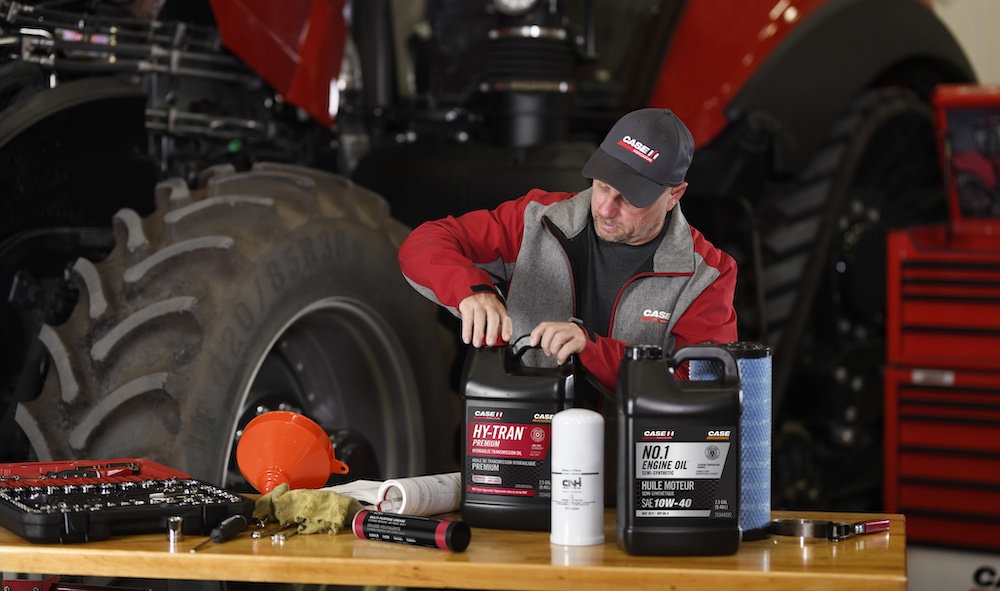Whether you are harvesting wheat or baling hay, combine and tractor components are under extreme pressure during operation, emphasizing the need to protect these high-horsepower engines and hydraulic systems. General maintenance is key to ensuring prolonged machine life and maximizing uptime.
A typical general maintenance routine includes fluid and filter changes and regular greasing. Our Case IH engineers always recommend using high-quality, genuine lubricants. We recently asked our customers what they wanted to know about the oil and grease they use in their equipment. Let’s take a look at a few of their questions and our engineers’ answers.
Q: “How can I boost performance and hours between oil changes in my equipment?” – Mackenzie from Alberta
A: Maximizing oil change drain intervals for your equipment begins with using genuine lubricants. Let’s use engine oil as an example. The drain interval recommended in the operator’s manual for your Case IH equipment may be 50 per cent longer than it would be with other engine oil options. The recommended oil change intervals published in the operator’s manuals are determined using multiple factors, including lubricant sump size, intensity of operation, operating temperature and recommended lubricant product.
Q: “When should I be using lithium grease vs. regular red grease?” – Jeremy from Nebraska
A: Grease is composed of three main parts: base oil for lubricating, a thickener (i.e., lithium, lithium complex, calcium sulfonate, etc.) to immobilize the base oil and additives to enhance the performance of the grease. The color of the grease you use is not an indication of performance level or thickener type.
Case IH offers several types of grease, including multi-purpose, hi-temp multi-purpose, multi-purpose moly, premium multi-purpose and others. Each option differs based on additives, thickener and suitable-use cases, like high or low temperature applications. We recommend reviewing your operator’s manual for guidance on which grease type you should apply based on equipment type and use.
Q: “Can you over-grease bearings or grease points?” – Bryce from Alberta
A: Over-greasing can lead to damage, depending on how it was applied and what component it was applied to on the machine. For example, adding too much grease to a sealed part could damage the seals, causing eventual grease leakage and potential equipment damage due to contamination or lack of lubrication. Simple pins or bushings without seals can be safely greased until the grease purges. Always check your machine’s operator’s manual for critical lubrication type, quantity and frequency, as it often varies based on the component.
Q: “We know about heat tolerance for lubricants, but what about cold tolerance?” – Jocelyn from Saskatchewan
A: At a basic level, a lubricant is unable to do its job unless it can physically get to where it is needed. Colder outdoor temperatures lead to a higher viscosity, or a thickening of the oil, which can keep it from flowing to critical components of your machine. Using synthetic products is a solution to interrupted lubricant flow. For example, a full synthetic 0W-40 engine oil would have better cold flow characteristics compared to a 15W-40 while providing the necessary protection for your equipment.
Q: “Should oil keep the same viscosity throughout its lifespan in the machine?” – Byron from Saskatchewan
A: Depending on the application and product used, it is possible for lubricant viscosity to change slightly over the course of the recommended drain interval. However, the viscosity of our genuine lubricants typically stays within a narrow range. Shear thinning or fuel dilution could cause lubricant viscosity to drop over time, while soot loading or oxidation could cause lubricants to increase in viscosity. To understand the current condition of the oil within a specific component of your machine, consider a routine oil analysis by a reputable program such as CNH Systemgard™.
Q: “How much oil do you need to purchase in a year for small bulk oil purchases to be a good investment?” – Kyle from Kansas
A: The Case IH small bulk program is designed for operations using 250 gallons or more of one eligible lubricant product each year. Purchasing engine or hydraulic oil in bulk offers multiple benefits for equipment owners with multiple pieces of equipment, including cost savings and efficiencies for your operation. When ordered from your local Case IH dealer, bulk oil is delivered to you for free at a lower price, thanks to bulk-price savings, and pumped directly into easily stackable storage tanks on your operation. The design of these small bulk storage containers reduces waste from leftover oil residue, lowers packaging waste and minimizes contamination risk.
Q: “How important is it to buy Case IH lubricants for my Case IH Equipment?” – Norm from Saskatchewan
A: We recommend selecting top-quality genuine lubricants specifically engineered for your New Holland equipment. Lubricants are a complex blend of base oils and additives. Our engineers developed and tested our line of genuine lubricants to maximize drain intervals and machine life.
The Case IH lineup, which includes No.1 Engine Oil™, Hy-Tran® Premium and Extended-Life OAT Coolant, promotes optimal equipment efficiency and lowers the risk of equipment failure. These lubricants are the only ones engineered, tested and proven for maximum performance. It’s a small investment to protect your large one.
Need to stock up your shop with lubricants for your next equipment maintenance cycle? Visit your local Case IH Dealer to purchase the highest-quality lubricants for your Case IH equipment.










